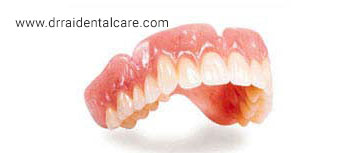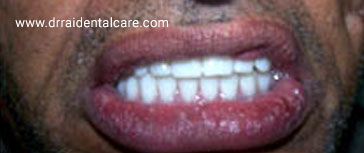

Teeth can be lost due to a variety of reasons like decay, gum disease, injury, neglect, medical and congenital problems. Without teeth, people have a difficult time eating; their face appears sunken giving them an "old" appearance when speaking and smiling. This results in a loss of self-esteem. Dentures can help reverse these conditions.
Replacing missing teeth has substantial benefits for your health and appearance. Denture prosthesis replaces missing teeth, gums and bone that have been lost. It provides support for the cheeks and lips and improves a person's ability to speak and to eat.
Dentures are either full (complete) dentures or partial-dentures. As the name implies, a complete denture replaces all the teeth whereas a partial denture will replace one or more teeth in the mouth.
They are generally acrylic (plastic) or porcelain teeth (or a hybrid of both), placed into an acrylic (plastic) tray that has been custom molded to fit the jaw bones.
The first step involves taking a series of impressions of the jawbones. From these records of your jaw positions are made, both when you close and when you speak. Then a trial denture is made to get a preview of the final dentures.
There are several critical factors involved when creating a denture. Such as the size, shape and colour of the teeth, the alignment of the teeth in the jaw and the fit of the teeth with the opposite jaw. When we sit down with our patients to create the best possible fitting dentures, often it will take several visits to get it "just right" since the mouth has many uses, including speech, aesthetics, chewing and support.
Once the trial dentures are finalized, they are processed in a durable, denture base material.
New dentures may feel awkward for a few weeks until you become accustomed to them. They may feel loose while the muscles of your cheek and tongue learn to keep them in place. It is not unusual to experience minor irritation or soreness and saliva flow may temporarily increase. As your mouth becomes accustomed to your dentures, these problems should diminish. One or more follow-up appointments are generally needed after a denture is fitted.
Your new dentures will fill out your cheeks and support your lips. They may even improve the look of your smile and help fill out the appearance of your face and profile. If old photos and other records are available, your dentures can be made to closely resemble your natural teeth so that little change in your appearance will be noticeable.
Initially eating will take a little practice. Start with soft foods cut into small pieces. Chew slowly using both sides of your mouth at the same time to prevent the dentures from tipping. As you become accustomed to chewing, add other foods until you feel you can return to your normal diet. Continue to chew food using both sides of the mouth at the same time. If, and when, your gum tissues are strong enough to try foods which are bitten off (bread, corn on the cob, etc.), try to press the food against the back teeth on the upper in order to stabilize the denture. Be careful with hot or hard foods and sharp-edged bones or shells.
When you first get your new dentures, your speech will be different. Some words you speak will sound different and your dentures may ‘click’ when you speak. As you use your new dentures and practice speaking, you will sound "normal" to yourself and others. Reading out aloud and practicing difficult sounding words will help you get used to speaking more normally. You may find your dentures occasionally slip when you laugh, cough or smile. Reposition the dentures by gently biting down and swallowing.
It takes a while for the gum tissues to firm up and accommodate the hard, new plastic denture. Sore spots are perfectly normal so if they develop, please be sure to wear the denture for at least 24 hours prior to your adjustment visit. This helps us see the sore spot visually so that we can make the necessary adjustments.
Like natural teeth, dentures must be cleaned daily to remove food deposits and plaque. Brushing prevents dentures from becoming permanently stained and helps your mouth stay healthy. It's best to use a brush designed for cleaning dentures or a toothbrush with soft bristles. Avoid using hard-bristled brushes as they can damage dentures. Dentures can be cleaned using a hand soap or mild dishwashing liquid. You may also use a certified denture cleaner for this purpose. You should clean your dentures at least once a day.
Dentures may lose their shape if they are allowed to dry out. When not worn, dentures should be placed in tap water. Never place dentures in hot water, as it causes them to warp or bend.
Dentures are quite delicate and may break if they fall and hit a hard surface. When handling your denture it is a good idea to stand over a folded towel or a basin of water. When you are not wearing them, store your dentures away from children and pets.
We prefer that you take your dentures out at night. This allows your gum tissues to breathe and also relieves them of the constant pressures exerted by the dentures. When left out of the mouth, all dentures should be kept in water to prevent warpage.
Dentures are made to fit precisely and usually do not require an adhesive. Sometimes however, due to the excessive loss of bone support or dryness of your mouth, you may need denture adhesives to make your dentures more comfortable.
Gum tissues are in a constant state of change but dentures are not. Over time the bone and gum ridges in the mouth recede and shrink, causing the jaws to align differently and the dentures to fit less securely. Thus as the mouth changes, your dentures may get looser and no longer fit correctly.
Loose dentures can cause health problems, like sores and infection, make chewing more difficult and change your facial features. It's important to replace worn or ill-fitting dentures before they cause problems. Over time, dentures will need to be relined, re-based or remade due to everyday wear.
If the dentures have become loose, but the teeth are not worn out, you may merely need to either reline or re-base your denture. A reline compensates for the changes in your mouth by adding to your original denture base. To re-base a denture, we use the existing denture teeth and make a new denture base. These procedures help make the dentures fit more securely against the tissues.
If the teeth in your dentures are also worn down, you will need to have a new denture made. Dentures that don’t fit well can cause problems and shouldn’t be used. Ideally you should change your dentures every 5-7 years.
NEVER try to adjust your dentures yourself. Without proper knowledge adjusting or repairing your dentures can seriously damage them and harm your oral tissues. A dentist can often make the necessary adjustments or repairs on the same day.
Immediate dentures are inserted immediately after the removal of the teeth. To make this possible, the dentist takes measurements and makes models of the patient's jaws before the teeth are extracted. The advantage is that the wearer does not have to be without teeth during the healing period. However, bones and gums shrink over time in the first six months following the removal of teeth. When gums shrink, immediate dentures may require re-basing or relining to fit properly.
Conventional dentures are made and inserted after all the teeth are removed and the tissues have healed. Healing may take several months.
In some cases we may decide to save the roots of some of your teeth. These roots are prepared and dentures are made to fit over them. The prepared teeth provide stability and support for the denture and their preservation slows down the recession of the jaw bones.
Integrating natural-looking replacement materials with the patient's original facial structure into a comfortable and pleasing appearance is our goal.